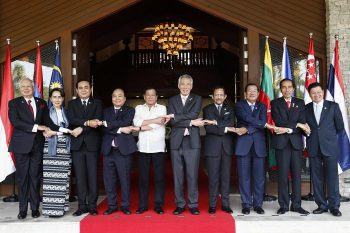風蕭蕭_Frank
以文會友法專家:西方必須走出認知誤區 直麵現實的中國
最近幾年來,西方政治以及經濟學者撰寫的有關中國的書籍可謂汗牛充棟,但真正能夠理性地,現實的描述中國的政治社會,分析中國崛起對西方造成何種影響的書籍卻屈指可數。法國知名學者,法國國際關係學院(IFRI)亞洲中心研究員 Sophie Boisseau du Rocher與 法國智庫托馬斯·摩爾學院(Institut Thomas More) 中國問題研究員 Emmanuel Dubois de Prisque 近日推出的新書:中國與世界,就是其中之一, 該書的書名一詞多意,也可以翻譯成中國是世界。 兩位作者發表此書的目的是為了讓法國,乃至歐洲的讀者了解一個真實的中國,而不是他們意想中的中國,他們認為,隻有在知己知彼的前提下,才能夠展開真正的對話。
Sophie Boisseau du Rocher 是一位高級研究員,專門研究東南亞政治、地緣戰略事務和區域一體化。 2015 年 11 月至 2023 年 12 月,她擔任 Ifri 亞洲研究中心的副研究員。她是眾多書籍和文章的作者
中國是/和世界看中國全球化
Sophie Boisseau du Rocher、Emmanuel Dubois de Prisque 一月 23, 2019
Sophie Boisseau du Rocher 是 IFRI(法國國際關係研究所)亞洲中心的研究員。作為東南亞問題專家,她對該地區與中國的關係進行了實地考察。 Emmanuel Dubois de Prisque 是托馬斯莫爾研究所的助理研究員,也是《亞洲新中國》雜誌的聯合主編。他在東亞工作了二十五年,曾在日本和台灣生活過。
中國重塑的全球體係及其利益的捍衛會是什麽樣子?全球平衡是否受到威脅,或者我們是否正在目睹對規則的務實改革,而這些規則無論如何都不再適應未來的挑戰?西方應該與這個力量並肩作戰,還是對抗它?當唐納德·特朗普領導的美國主張民族主義撤軍時,歐洲還有牌可打嗎?堅定的國家主席習近平宣布了這些計劃:到 2049 年成為世界第一強國。因此,如果中國準備主宰二十一世紀,了解其特質、動機和行為就勢在必行。
本研究的目的是描述中國感知世界的方式,並打算改變它以使其有利。這本書展示了中國有能力利用其所掌握的所有載體和實踐——硬實力、軟實力和銳實力——讓世界相信它所發明的中國全球化(天下)的吸引力,並輕而易舉地改變了遊戲規則(例如,製定新的工業和環境規範)。通過這樣做,中國正在取代以前的西方治理,一種可能成為子孫後代規範的新治理。這一雄心壯誌並非沒有風險:對於中國人、對於世界其他地區以及對於人文共享資源的管理。
東南亞與威權誘惑·中國模式的影響
IFRI 副研究員 Sophie Boisseau du Rocher 和 Thomas More 研究所研究員 Emmanuel Dubois de Prisque
2017 年 6 月 • 注釋 24
近年來,中國習近平一直在東南亞國家測試其權威而複雜的“模式”的吸引力。泰國、馬來西亞和菲律賓等國引入“民主”是否可以被視為加強中國模式及其在這些政權眼中吸引力的結果?看來是這樣:在中國和這些國家一樣,民主和法治越來越被視為危及穩定和繁榮的烏托邦。
西方國家夢想建立一個按照其形象塑造的世界、民主計劃體現了對更光明未來的承諾的時代早已一去不複返了。在1997年危機的政治動亂之後,我們認為東南亞的案件已經解決:在很大程度上加劇了動亂的威權主義崩潰給實施涉及所有公民有益的民主進步的機製帶來了希望,即一項規則保障公民、法律和政治平等的法律。
但實質上:除了通過中國強國迅速恢複增長(這種複蘇實際上暫停了改革的實施)之外,2001 年 9 月 11 日的事件還通過削弱新建立的民主結構對這次革新產生了雙重影響和機製,並在政治空間中恢複軍事因素(武裝部隊)。從間歇性的動蕩到深刻的危機,東南亞的政治轉型並不是線性發生的;我們今天看到的肆無忌憚的暴行預示著民主過渡的黯淡未來。
在工作過程和互動中,中國因素並不是最不重要的。這一因素通過建立相互依賴關係在多個方麵得到體現,這種相互依賴關係或多或少地限製了像企業這樣的領導者與流動的聯係,這些流動可能潛在地將該地區與依賴模式聯係起來,這似乎適合更深入地探索。一個關鍵的根本問題是:中國的壓力和東南亞所表現出的威權誘惑同時出現是否巧合?它宣布了什麽?
中國根據不同領域或多或少地表現出的壓力是在全球化的背景下發生的,這種全球化在曆史上以殖民影響為標誌,涉及與外部世界的權力關係和自我妥協。恰恰在今天,我們觀察到麵對西方化的一種抵抗感,這種西方化最初是由殖民統治強加的,其次是由殖民統治強加的。通過自由全球化,長期以來,自由全球化一直以粗暴而浮誇的方式宣揚“市場民主”的優點;人們認為,在1997年危機後的公民抗議之後,亞洲價值觀被擱置,但習近平巧妙地複興了這些價值觀,以解釋為何拒絕接受受操縱的選民仲裁的個人權利和政治競爭的支配,並奉承征服民族主義。自我妥協的形式是捍衛代表更高利益而獲得的利益和捍衛政治文化。著名的民主價值觀的普遍性受到人們的關注。中國現在希望在思想和價值觀領域留下自己的印記。
這種質疑既助長了影響西方國家的危機,也助長了中國模式所謂的吸引力。目前,時間的伸縮偏差正在對中國有利。歐盟持續的經濟疲軟、美國經濟放緩以及這些地區麵臨的地緣政治、移民和文明挑戰,削弱了基於自由保障的政治體製必然有利於增長和發展的證據,並最終增加一個國家的力量。歐洲民粹主義的興起、英國脫歐和唐納德·特朗普當選美國總統等事件都讓東南亞對民主實踐的相關性甚至優點提出了深刻的質疑。相反,中國在過去30年中經曆的增長、其在國際舞台上實現穩定和增強實力的能力,增強了人們對將政治自由與經濟自由脫鉤的興趣。此外,由聚合和積極的利益聯合起來的精英的存在,控製和服從社會的其他部分,可能成為權力的必要條件,因為這個精英以國家利益的名義“糾正”公眾輿論的任何錯誤。 。中國當局正是這種新的威權平衡與民主的缺陷和風險日益形成鮮明對比。東南亞是首選的試驗場。
因此,自 2008 年金融危機以來,我們觀察到了一種漸進但實質性的獨裁趨勢,這種趨勢在不同的國家以不同的形式出現,但標誌著遠離民主治理,或者更簡單地說是法治,順便說一句,領導人甚至企業都遠離民主治理,甚至是企業。 ,從未完全訂閱。在威權誘惑、民主腐敗和公民的新要求之間,很難看清東南亞國家的政治發展。任何比較都可能顯得過於簡單化。然而,三個國家似乎比其他國家麵臨更大的風險,值得特別關注:馬來西亞、泰國和菲律賓。這些國家現在將為我們的假設提供例證。
China Is/and the WorldA Look at Sino-globalization
Sophie Boisseau du Rocher, Emmanuel Dubois de Prisque January 23, 2019
Sophie Boisseau du Rocher is research associate at the Centre Asie of the IFRI [French Institute for International Relations]. A specialist in Southeast Asia, she does fieldwork on the region’s relations with China. Emmanuel Dubois de Prisque is research associate at the Institut Thomas More and co-editor-in-chief of the journal Monde Chinois nouvelle Asie. He has been working for twenty-five years on East Asia and has lived in Japan and Taiwan.
What will a global system remodeled by China and the defense of its interests look like? Are global balances threatened, or are we witnessing a pragmatic overhauling of rules that in any event were no longer adapted to the challenges of the future? Should the West accompany that power, or confront it? Does Europe have a card to play when Donald Trump’s United States is arguing for a nationalist withdrawal? The plans have been announced by a determined President Xi Jinping: by 2049 to be the foremost world power. And so, if China is preparing to dominate the twenty-first century, understanding its idiosyncrasies, its motivations, and its behavior is imperative.
The goal of this study is to describe the way in which China perceives the world and intends to modify it to its advantage. The book shows China’s ability to use all the vectors and practices at its disposal – hard, soft, and sharp power – to convince the world of the attractiveness of a Sino-globalization that it has invented (Tianxia) and, with a light hand, transformed the rules of the game (the development of new industrial and environmental norms, for example). In doing so, China is substituting for the former Western governance a new governance that might become the norm for future generations. An ambition that is not without risks: for the Chinese, for the rest of the world, and for the management of humanities shared resources.
South-East Asia and authoritarian temptation · The impact of the Chinese model
Sophie Boisseau du Rocher, Associate Researcher at IFRI, and Emmanuel Dubois de Prisque, Research Fellow at the Thomas More Institute
 June 2017 • Note 24
June 2017 • Note 24




